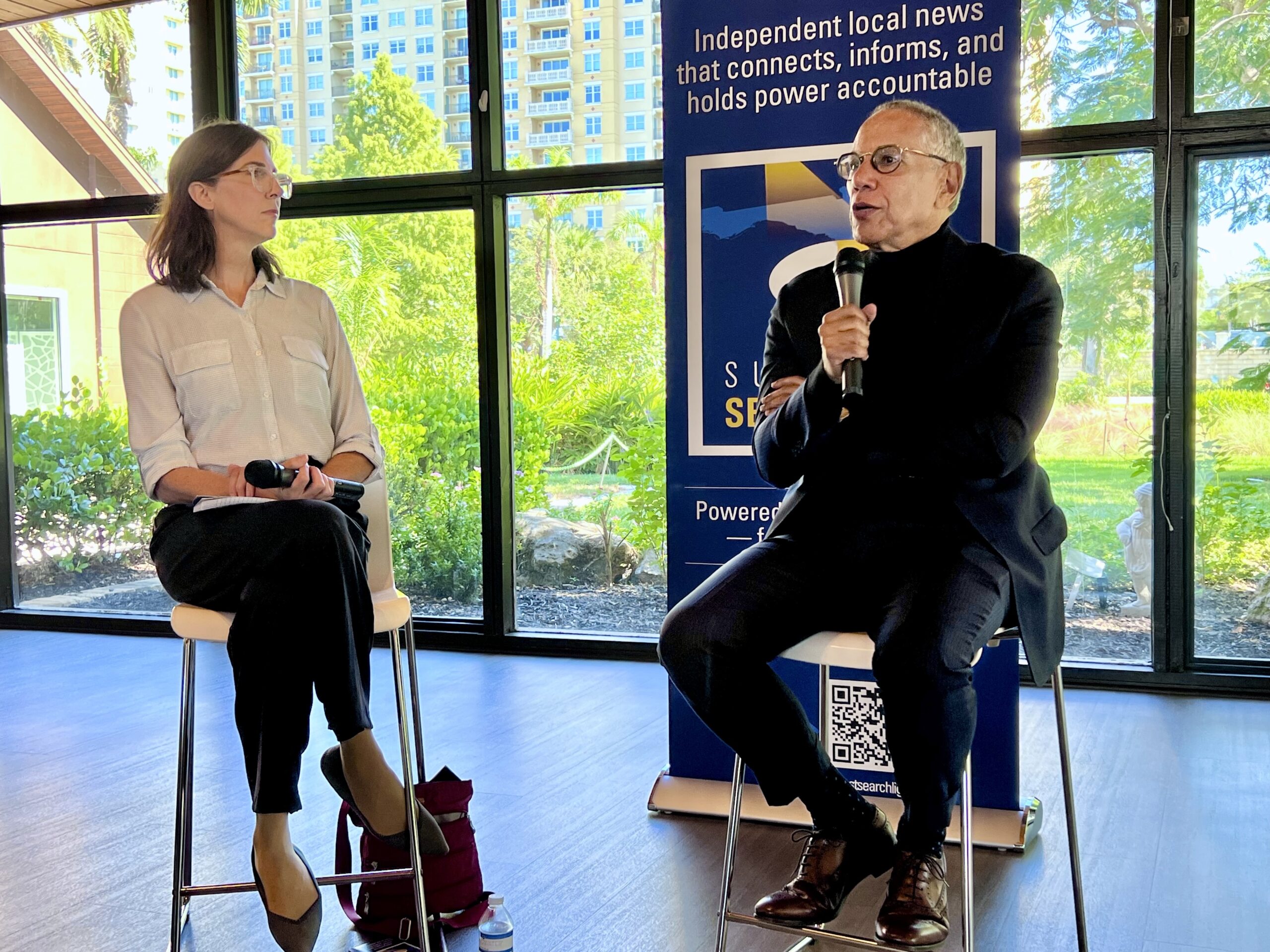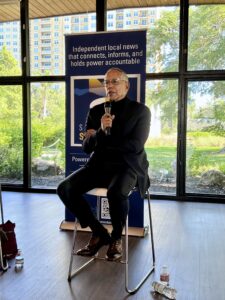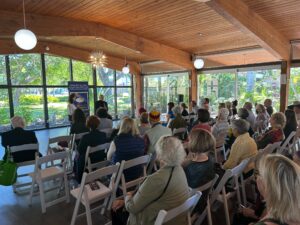
New York Times editor visits Sarasota to discuss state of local journalism
The future of local journalism is uncertain, but not doomed, according to a former executive editor of The New York Times.
Dean Baquet, who led the Times from 2014 to 2022, visited Sarasota Thursday for a community conversation on the challenges and opportunities in local journalism, hosted by Suncoast Searchlight. Dozens attended the event, which was the first in the Searchlight Series that aims to deepen public understanding of the media industry and connect residents with the journalists who serve them.
“The good news is the nonprofit news industry, if you will, which didn’t even exist when I started … it will be, certainly, at least be a giant part of the future of journalism,” said Baquet, who now runs the Times’ Local Investigations Fellowship, a program that supports journalists at regional outlets in producing major investigations.

Former New York Times Executive Editor Dean Baquet spoke about the future of local journalism during an event hosted by Suncoast Searchlight at the Sarasota Garden Club on Thursday, Nov. 14. | Photo by Kara Newhouse, Suncoast Searchlight
“In my fantasy, you get to the point where the local news organization becomes like the library or the museum,” he continued. “You want to have somebody who covers your community, and you contribute to it – and it’s not just five zillionaires or five giant philanthropies – that people actually subscribe, pay for it.”
Baquet’s remarks come at a time when news deserts – areas with limited local news coverage – are growing, and Americans’ trust in news has reached a new low.
Joy Mayer, a Sarasota County resident and executive director of Trusting News, an organization that provides resources and training to journalists, attended the event.
“I found it really inspiring how many people in the community who aren’t connected to journalism showed up for a conversation about the importance of local news,” Mayer said. “I think there’s a lot of energy around organizations like Suncoast Searchlight and the role that they play in communities.”
Speaking at the Sarasota Garden Club, Baquet answered questions submitted in advance from attendees and from Suncoast Searchlight Executive Editor-in-Chief Emily Le Coz. He discussed the impact of upheaval in the news industry, the rise of digital and nonprofit journalism and how journalists can respond to better serve communities.
Cuts and closures: News outlets face growing challenges
Baquet’s storied career began in New Orleans in the 1970s. Since then, the newspaper industry has undergone tremendous change, particularly in the last 20 years as the rise of the internet undercut advertising revenue and news consumption habits changed with technology.
“Local journalism is in real trouble. Truly in real trouble. The economic model has been completely wiped out,” Baquet said.
Stay informed: Sign up for our weekly newsletter
Almost 40% of local newspapers in this country have disappeared since 2005, according to “The State of Local News 2025” report from the Medill Local News Initiative at Northwestern University.
That’s stark, but Baquet said, “even the death of newspapers doesn’t really capture” the extent of the crisis, because the papers that remain often are operating on skeleton crews.
The newspaper industry had shed three-quarters of its jobs during the last two decades, the Medill report found.
Those losses have contributed to divisions and a sense of disconnection in our society, Baquet said.
“I think the reason we keep getting surprised in the national elections, starting with 2016 is because we don’t have the local journalism that surfaces the issues that Americans care about,” he said. “With the collapse of traditional local news, I think we’ve lost the ability to understand what people really care about locally.”
Nonprofit news emerges as bright side
Amid those challenges, new outlets, including digital-only and nonprofit newsrooms like Suncoast Searchlight have emerged. The Medill report counted more than 300 startups in the last five years.
“I think that’s the bright side,” Baquet said. “There’s some news organizations, including yours, that didn’t exist not so long ago that are now robust, building and trying new stuff.”

Suncoast Searchlight Executive Editor-in-Chief asked former New York Times Executive Editor Dean Baquet questions submitted by attendees during a community conversation about the news industry on Thursday, Nov. 14. | Photo by Sam Ramlall for Suncoast Searchlight
Baquet named ProPublica’s coverage of undisclosed gifts to Supreme Court Justice Clarence Thomas, Mississippi Today’s investigation of abuse by sheriffs and their deputies, and The Baltimore Banner’s reporting on fentanyl as standout examples.
Sarasota Mayor Debbie Trice, who attended the event, said she appreciated Baquet’s message about supporting local news outlets.
“It’s really important to get the news from professional journalists,” Trice said. “What I’m seeing too much of is local gadflies are posting their take on the news on social media, and it’s never as accurate as you would hope it would be. … When there’s a hot item before the commission, I will get over 100 emails based on misinformation, and that takes time away from really doing what I need to do.”
Transparency in newsgathering could be key
Adding to journalism’s difficulties in recent years is the threat of what Baquet called “frivolous lawsuits” from powerful people, including President Donald Trump.
Trump refiled a $15 billion defamation lawsuit against the Times last month after a judge dismissed his initial complaint.
Baquet acknowledged that journalists make mistakes but said that’s not what such lawsuits are about.
“I think it’s a relatively new tactic. It’s particularly treacherous, and I think it’s designed to squash free flow of information,” he said.
Baquet said hostility from politicians, including the refrain of “fake news,” has contributed to Americans’ distrust of journalism.
In response, he said journalists must get better at explaining their work to the public. New nonprofit outlets, in particular, have an opportunity to communicate with audiences in a way that traditional media organizations haven’t, according to Baquet.
“Be extraordinarily transparent,” he said.
The next event in the Searchlight Series will feature a conversation on growth and development in the region, moderated by Suncoast Searchlight journalists Derek Gilliam and Josh Salman. The event is scheduled for Dec. 10 at Solis Hall in Wellen Park.


